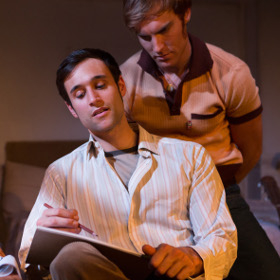Passing By

© Scott Rylander
Passing By, first seen in New York in 1974 and London a year later, is a play of its time. 40 years ago it was brave, forward looking, innovative and honest to tell an innocent story of two men having an unashamed affair.
Ten years later and it would have been impossible, or at least very different, against the background of Aids. It has been, moreover, revived only very occasionally since which makes this outstanding production by Arion Productions (first last year at the Finborough and now having a second outing at Tristan Bates Theatre) very welcome.
Rik Makarem gives us a twitchy, nervous, hypochondriac Toby often teased and laughed at by James Cartwright‘s magnificently good looking Simon after the two meet in a cinema and are compelled by instant attraction to Toby’s flat. Martin Sherman‘s fine, highly wrought script, means that both characters alternate between childish petulance and quasi adult calm-ish impatience – it’s a deliciously well observed depiction of how couples relate to each other, constantly shifting ground and swapping roles within the relationship.
The acting is impeccably intelligent. Both men play expertly off each other and use silence and pace to achieve an unusually accomplished balance between poignancy and humour. And there are some very funny lines in this play with plenty of irony which feels more British than American, although the setting is New York and the voice work flawless. Even the sex is gently understated and punctuated with a lot of impulsive kissing and affectionate encounters as opposed to graphic passion.
It is quite an achievement to create something which is touching, serious and satisfying but never allowed to degenerate into cheap tragedy. In the end, as Sherman says, it is ‘just an affair’ to be accepted for what it is without shame or apology.
Director Andrew Keates and his team, including Philip Lindley‘s slightly shabby set so evocative of the 70s, get the tone absolutely right.










